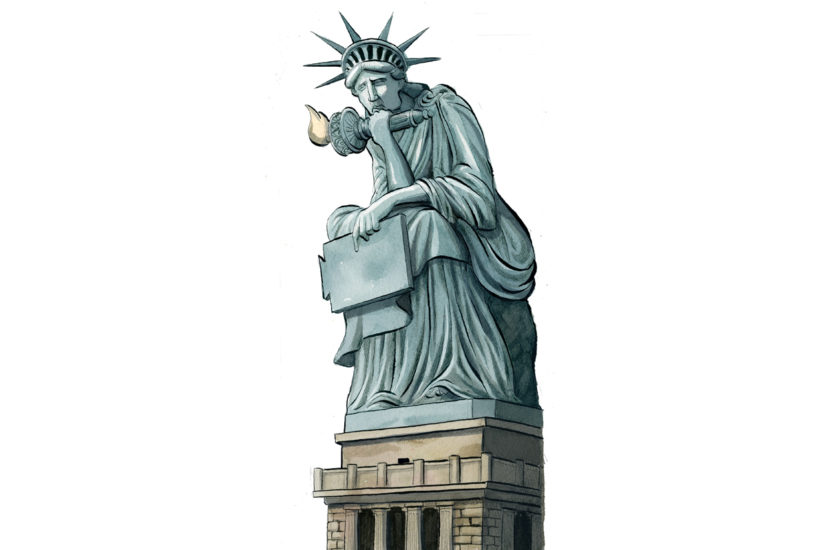In the furore over Trump’s bid to fill the vacant Supreme Court slot, commentators have pointed out that his nominee’s first job may be to rule on the validity of the election result. Is that likely to happen? As the judge in the election court that exposed serious voter fraud during the 2004 Birmingham council elections in the UK and in several other election cases involving fraud, I think I may be able to go some way in answering that question.
Fear over a disputed election stems from President Trump’s claim that postal voting is vulnerable to widespread fraud — committed, one need hardly say, by the Democrats. The Democrats have naturally reacted with horror and outrage, denying that they would ever dream of such a thing (being bound to win anyway). But they have gone further and asserted that such fraud is not only unthinkable but impossible. This stance has been adopted by the liberal media — but it is clearly wrong. Fraud is eminently feasible. Whether it will actually occur is another matter, but it is far from impossible.
All systems of postal voting on demand (rather than for reasons such as absence from the country) are wide open to potential fraud. Procedures can be tightened and safeguards introduced. And though they can make fraud more difficult, they can never fully eliminate postal vote manipulation.
The system for electing the president, much revered by Americans as handed down from the Founding Fathers, is incomprehensible to most outside the country and has never been imitated. The idea of electing a president by universal adult suffrage in a two-man contest by a method which can, and often does, see the election of someone who receives a minority of the popular vote, can only be made to appear democratic by great sophistry. As we all know, each state votes to elect delegates to an electoral college, the number of delegates being proportionate to the population of the state, and the college then elects the president. Victory for a candidate in a state, even if only by one vote, usually secures all the delegates for that state, hence the likelihood of a disparity between the national popular vote and the line-up of delegates to the college.
The key point is that each state is master of its own election processes. Provided the state ensures that all those citizens registered to vote are given the opportunity to do so, it is up to the state to decide the modes of voting and the processes for counting — and, if necessary, recounting — the votes. Unless the process reaches a point where it might contravene the constitution, federal input into the election is virtually nil.
If the election process is contested within a state rather than at the federal level, it will go to that state’s Supreme Court. Members of an individual state’s Supreme Court are appointed by a procedure that generally mirrors the Federal Supreme Court. The governor nominates and the state’s senate confirms, meaning that appointments are just as political as those to Washington and in some cases more so. If a state has had a Republican governor and a Republican senate for donkey’s years, you will not be seeing a lot of Democrats on its supreme court.
This contrasts markedly with the UK where election courts are almost obsessively non-political. Judges are not appointed to try election cases where they have any political connection and electoral law expressly forbids a judge being appointed who lives in the electoral area concerned. The only question I was asked when approached to try the Tower Hamlets petition was whether I lived in the area (the Mayor of Tower Hamlets was eventually removed in 2015 for, among other things, electoral fraud).
But is postal voting fraud really possible in the USA? The short answer is yes. Even the pro-Biden press in America admits that the system is shambolic. There is not even a general rule that postal ballots should be sent out with pre-paid reply envelopes. If we had to pay to post our own votes in the UK, enthusiasm for postal voting would take a severe hit. In the UK it is postal voting on demand — you have to register for a postal vote. In at least four states, every registered elector is sent a postal vote whether they ask for it or not. In the US, there is strong resistance to voting systems where postal votes are verified by a signature that is compared with a signature held on file. Vote-harvesting, where ‘community organizations’ collect and deliver sealed ballots, is actually a Democrat demand rather than a prohibited practice. Whereas in the UK there is the sensible rule that, in order to count, a postal ballot must reach the returning officer by close of poll (usually 10 p.m. on polling day), in the US votes are counted if they appear to be postmarked before close of poll.
There are essentially two basic types of postal vote fraud. One is tampering with the ballots (either before or after genuine voters receive them) and the other is manipulating the electoral register. The voting system just described is patently vulnerable to all the varieties of ballot tampering known to the courts (in Birmingham we stopped counting at fourteen different varieties). What’s more, when safeguards of the most elementary kind are absent, detection will be virtually impossible.
[special_offer]
The second category of fraud is self-evidently feasible. Because so much effort is spent in America persuading citizens to register and so much electoral malpractice in the past has concerned trying to exclude citizens (most notoriously black citizens) from registering, the authorities are only too glad to get registrations. Very few states have any safeguards against bogus registrations — even in the UK the safeguards are weak. Filling the register with fake voters or with the names of genuine people who actually live in some other district (what the Australians call ‘roll-stuffing’) is not difficult. The problem is compounded by the fact that, in many states, the registration and returning officers (often the same person) may well be political appointments and not, as in the UK, apolitical local civil servants. Turning a blind eye to roll-stuffing is bound to be a temptation in an election as bitter as this.
Thus postal vote fraud is clearly feasible in the US — but could it make a difference? In the UK, voter fraud is largely confined to local elections for the simple reason that in wider elections it is logistically too difficult (and often too risky) to produce enough false votes to be sure to make a difference. The Birmingham fraudsters managed about 1,500 forgeries per ward but that was pushing the limit. At parliamentary (and, obviously, referendum) level, the numbers are against the fraudster. Now if the presidential election were a first-past-the-post popular vote, significant fraud could obviously be ruled out. But it is not. The election will turn on ‘swing states’ which will often come down to votes in smaller voting districts. Remember, the disputed votes in a small number of districts in Florida amounted to no more than a few hundred but they gave victory to George W. Bush. Well-targeted local fraud could sway this election.
None of this is to say that fraud will happen, only that it can happen and happen easily. President Trump may be wrong to say it will happen but the Democrats are certainly wrong to say it can’t.
This article was originally published on The Spectator’s UK website.
Watch The US Election in 60 Minutes: The Spectator’s chairman Andrew Neil speaks to Marcus Roberts, director of international projects at YouGov; Luke Thompson, a Republican political strategist; and The Spectator’s US journalists about the presidential debate in Cleveland, Ohio.

























